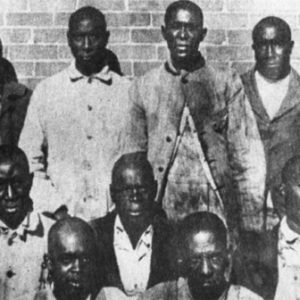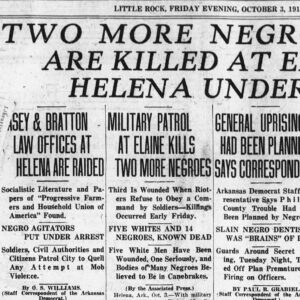calsfoundation@cals.org
William Wordlaw (1897–?)
William Wordlaw (sometimes spelled Wardlow or Wordlow) was one of twelve men arrested and charged with murder following the events of the Elaine Massacre of 1919. After brief trials, the so-called Elaine Twelve—six who became known as the Moore defendants and six (including Wordlaw) who became known as the Ware defendants—were found guilty of murder and sentenced to death. Ultimately, the Ware defendants were freed by the Arkansas Supreme Court in 1923; after numerous legal efforts, the Moore defendants were freed in 1925.
William Wordlaw was born to sharecroppers Edd and Georgia Wordlaw on August 19, 1897, in Pontotoc, Mississippi. William and his six siblings grew up helping their parents farm the land. According to his draft registration documents, he had married Willie Bell Wordlaw by 1918. At that time, Wordlaw lived in Wabash (Phillips County) and worked as a sharecropper for the Howe Lumber Company. Wordlaw grew cotton and corn on sixteen acres of land. Ida B. Wells’s investigation of the Elaine Massacre indicated that Wordlaw produced sixteen bales of cotton, then valued at $225 per bale ($3,600 total value), but was cheated out of the proceeds of his harvest. To fight this injustice, he and neighboring sharecroppers joined the Progressive Farmers and Household Union of America.
Wordlaw attended the September 30, 1919, union meeting at the Hoop Spur (Phillips County) church where the first shots of the Elaine Massacre were fired. During the massacre, he was arrested, and on November 4, 1919, he was charged with capital murder for his alleged participation in the death of W. A. Adkins, a white officer shot at Hoop Spur. In his statement, Wordlaw contended that he could not have killed Adkins because he was unarmed. He continued his testimony of the incident, insisting that following the attack on the church, he and other men in the union helped hide women and children in the woods before his capture. However, the jury took less than two minutes to find him guilty. Wordlaw was sentenced to death along with eleven other members of the union.
The cases of the Elaine Twelve drew the attention of the National Association for the Advancement of Colored People (NAACP), which galvanized support for the men and raised money for their legal counsel, and the civil rights lawyer Scipio Jones came to their defense. In December 1919, the men were granted a stay of execution by Governor Charles Brough, allowing for appeal. In March 1920, Wordlaw’s death sentence, along with those of the five other Ware defendants (Ed Ware, Albert Giles, Alfred Banks, Joe Fox, and John Martin), was reversed by the Arkansas Supreme Court, and the men were sent back to Helena (Phillips County) for a new trial based on a technicality. A May 1920 retrial in Helena upheld the convictions. In December 1920, the Arkansas Supreme Court reversed the decision from Helena and called for a new trial. An April 1923 petition demanded the release of the prisoners due to the lack of trials for the last two court sessions, and on appeal, the Arkansas Supreme Court agreed, releasing Wordlaw and the five others. The other six members of the Elaine Twelve, the Moore defendants, were released in 1925.
William Wordlaw’s life after prison is unknown.
For additional information:
Cortner, Richard C. A Mob Intent on Death: The NAACP and the Arkansas Riot Cases. Middletown, CT: Wesleyan University Press, 1988.
Lancaster, Guy, ed. The Elaine Massacre and Arkansas: A Century of Atrocity and Resistance, 1819–1919. Little Rock: Butler Center Books, 2018.
Stockley, Grif, Brian K. Mitchell, and Guy Lancaster. Blood in Their Eyes: The Elaine Massacre of 1919. Rev. ed. Fayetteville: University of Arkansas Press, 2020.
Wells, Ida B. “The Arkansas Race Riot.” Chicago: 1920. https://archive.org/details/TheArkansasRaceRiot/ (accessed May 1, 2019).
Whayne, Jeannie M. “Low Villains and Wickedness in High Places: Race and Class in the Elaine Riots.” Arkansas Historical Quarterly 58 (Autumn 1999): 285–313.
Whitaker, Robert. On the Laps of Gods: The Red Summer of 1919 and the Struggle for Justice that Remade a Nation. New York: Crown, 2008.
Brian K. Mitchell, Kary Goetz, Jessica Chavez
University of Arkansas Little Rock
 Civil Rights and Social Change
Civil Rights and Social Change Early Twentieth Century, 1901 through 1940
Early Twentieth Century, 1901 through 1940 Elaine Massacre Defendants
Elaine Massacre Defendants  Elaine Massacre Headlines
Elaine Massacre Headlines 




Comments
No comments on this entry yet.